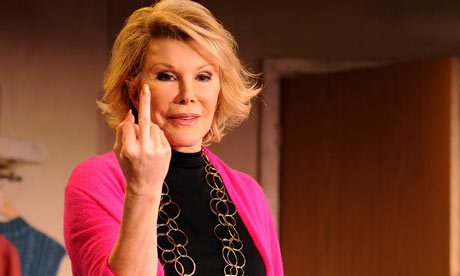Broad Sides

Joan Rivers saddens me. I shouldn't care, doubt that Rivers would return the feeling; but after watching A Piece of Work, all I felt was sadness.
Granted, I've been in a sad mood of late, so that affects my emotional curve. Yet Rivers at 75, scrambling for any gig, regardless of quality, made me wonder if comedy means anything anymore. Rivers is a legend, or at least a serious comic figure. She plowed into the men's stand up world and staked her claim, one of the few female comics to earn Johnny Carson's approval. Her energy was infectious, her timing frenetically keen. Rivers began in theater and it shows. As she puts it, she's an actress playing a comedian.
Maybe so. But the character long ago consumed the actress, encasing what remains of Rivers in a surgically-altered state. Now she's viewed as a freak, which is her own doing, a vanity junkie who never tired of the needle. Throughout the film, Rivers bemoans her age and health, claims that she's broke while riding in limos and private jets, sees various conspiracies aimed at taking her down, and throws self-pity parties at the slightest provocation. I'm sure others are put off by Rivers' behavior, and rightly so. Yet all I see is damage and debris.
If nothing else, Rivers deserves credit for surviving Carson's wrath, keeping her career afloat by any means necessary. Not many comics could do that. Seeing how it affected Rivers as a person, that's probably a good thing. Her bitterness and anger can be extreme even for a comedian. If Rivers has a philosophical core to her humor, A Piece of Work doesn't reveal it. She simply plugs along because that's what performers do. As she constantly reminds us, she needs the money. "She'll do anything" her manager tells a prospective employer as Rivers nods her assent. Showbiz is usually over compared to prostitution, but you rarely hear it put so plainly.
Carrie Fisher has seen her share of showbiz destruction. In Wishful Drinking, she offers a more playful tone than what Joan Rivers seems capable of. Not that there isn't anger, sadness and regret. Fisher's story is well known to entertainment buffs, and her stage show covers a lot of old ground. Growing up with Debbie Reynolds and Eddie Fisher, with Elizabeth Taylor as a stepmother, was not a traditional childhood, perhaps not even by Hollywood's twisted standards. Fisher grew up extremely fast amid varied madness -- drugs and booze heavily included -- becoming famous at 20 through Star Wars. She then receded from the main stage as a supporting actress, script doctor, and novelist.
Fisher recounts each phase, relaxed but pointed, smiling as if knowing that her story is too crazy not to be true. Unlike Joan Rivers, Fisher doesn't seek sympathy; she seems to have made a rough peace with her life. This frees her to be funny, most often in self-deprecating ways. Everyone in showbiz is a candidate for victimhood. Carrie Fisher could easily play that card, but she opts for humane surrender. If you can't conquer your demons, co-opt and make them work for you. If nothing else, you'll have plenty of ripe material.


<< Home